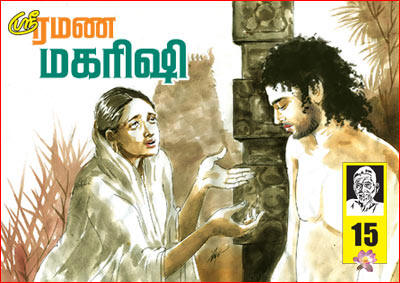15Ramanamaharishi20101105.html
Sakthi Vikatan 2010-11-05-part1-2
Ramanamaharishi.
Guru’s Grace.
Author Balakumaran![]()
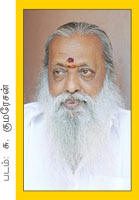 After
the family members discovered the letter of departure from home, the
family was on tenterhooks. We had no anger issues with him. We were
never hard on him. Why did he leave? Where did he go?
After
the family members discovered the letter of departure from home, the
family was on tenterhooks. We had no anger issues with him. We were
never hard on him. Why did he leave? Where did he go?
Venkatraman’s mother was wailing from losing her son to the world. Being
a widow, whom was she going to ask for help? She sought help from the
relatives. They were busy with their own needs, responsibilities and
duties. Everyone showed concern about the disappearance of Venkatraman.
Hearing that a boy participating in a play in a local theater looked
like Venkatraman, they attended the play and discovered it was not him.
They ran to Thiruvananthapuram on false news, discovered it was not him
and came back disappointed.
They did not know where else to go in search of him. There were no
transportation facilities, no roads and no highways those days as seen
nowadays. Travel was difficult. These factors put a brake on further
search. Azakammai went into grief and deep depression.
Annamalai Thambirān addressed a group of people after arriving from
Tiruvannamalai. He said, Bālaswāmy was Venkatraman from Tirucchuzhi. A
boy in the audience, related to Venkatraman, informed the relatives of
the good news. They were surprised. There was no other Venkatraman in
Tirucchuzhi. Concluding, it must be him, Sundaramaiyar’s younger
brother, Venkatraman’s uncle went to Tiruvannamalai.
The crowd was big in Gurumūrththam,
one Venkatrama Nāyakkar
invited Pazhaṉisāmi to stay in his mango grove. Pazhaṉisāmi informed
Bālaswāmy about it, both left the Gurumūrtham and moved to the mango
grove. There was a sturdy fence around the mango grove. A guard was on
duty at the gate. There was a serious reduction in the number of people
gaining entrance into the grove. Venkatraman Nāyakkar told the guard not
to let anyone inside without permission from Pazhaṉisāmi.
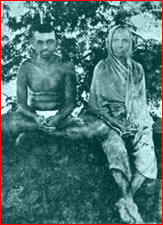 With
no troubles, Bālaswāmy lived solitarily on a raised platform under a
mango tree. Below the platform Pazhaṉisāmi sat. Bālaswāmy and
Pazhaṉisāmi ate the food brought by Darśan-visitors, asked the visitors
not to bother Bālaswāmy and arranged for Bālaswāmy to remain in
seclusion.
With
no troubles, Bālaswāmy lived solitarily on a raised platform under a
mango tree. Below the platform Pazhaṉisāmi sat. Bālaswāmy and
Pazhaṉisāmi ate the food brought by Darśan-visitors, asked the visitors
not to bother Bālaswāmy and arranged for Bālaswāmy to remain in
seclusion.
The family came visiting.
The watchman on duty refused admission to Sundaramaiyar’s brother
Nellaiyappar accompanied by a friend Nārāyaṇasāmy
Iyar. Nellaiyappar sent a note about his credentials (paternal uncle).
Bālaswāmy himself came the gate and invited them. Seeing Bālaswāmy,
Nellaiyappar felt suspicion, ‘could he be really the son of my older
brother? Long nails, matted hair, gaunt appearance…
Venkatraman (presently Bālaswāmy, future Ramana) had a large
congenital flat mole on the sole of his foot. Nellaiyappar intently
looked for the mole and finding it, he was satisfied in his mind about
the authenticity of Venkatraman. He could not fathom the state Bālaswāmy
was in. He thought he was practicing Hata Yoga.
He begged Bālaswāmy to go back to Madurai and said, “Why are you
suffering like this here? Come home. I will arrange for a place where
you can continue to practice Samadhi.”
Bālaswāmy did not reply to him. Nellaiyappar was a great Sadhu and
soft-spoken. He thought no one should be pressured and manipulated. He
was in a predicament with these thoughts. “Why is this child sitting
here like this? It is not proper. This state of Samadhi comes only after
complete study and elucidation of Vedas and Tattvas. This is most likely
a spurious asceticism, leading to an unknown consequence. I am in the
dark.”
Nearby, an elderly man was lecturing; Nellaiyappar enquired about
Bālaswāmy. The lecturer gave a portrayal of Bālaswāmy in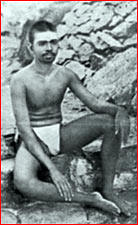 derogatory way saying, “O that Bālaswāmy, it is sitting there in a
stubborn fashion. He does not know a thing. Those who have no Vedic
knowledge cannot perform Tapas. It is a false pretense for him to sit
there with clenched jaws.
To Nellaiyappar, it sounded plausible. The world easily falls into the
belief that one is an exponent of Vedas with appearances: Rudrāksha
beads, sheared head, Sacred Ash across the forehead, water vessel… His
matted hair, dirty body, thin famished frame, long nails, perennial
silence, blank looks…give a spectator the impression of mental
aberration in Bālaswāmy.
derogatory way saying, “O that Bālaswāmy, it is sitting there in a
stubborn fashion. He does not know a thing. Those who have no Vedic
knowledge cannot perform Tapas. It is a false pretense for him to sit
there with clenched jaws.
To Nellaiyappar, it sounded plausible. The world easily falls into the
belief that one is an exponent of Vedas with appearances: Rudrāksha
beads, sheared head, Sacred Ash across the forehead, water vessel… His
matted hair, dirty body, thin famished frame, long nails, perennial
silence, blank looks…give a spectator the impression of mental
aberration in Bālaswāmy.
Māyai
is a decorative piece. It is falsity. It hides the true nature and
projects false appearances. It has no truth. Truth (Satyam) is not bound
to anything. Those who are deceived by decorations or external
appearances, it is hard for them to understand and comprehend Satya
Sorūpam (True form). Those who speak loud like thunder think they are
great intellectuals and Jñavāṉs
(Paragons of Wisdom). A raft of comparisons, spouting of songs with loud
accompaniments...give them a feeling of omniscience. Bālaswāmy with
silence and controlled breathing, no one understands.
There was a continued flow of visitors. There were about 10 to 20 people
standing around near the gate for Darśan of Bālaswāmy. A little movement
precipitated a divine appeal, acclaim and call: ‘Hail Annamalai.’ It
became necessary to appeal to the crowd to tone down the clarion call of
the divine.
Aruṇagiri
Nāthar
Temple was near the Ayyan Lake. For some time Bālaswāmy stayed in the
temple. It was a beautiful, cool, ancient Temple. He went to the nearby
houses, clapped his hands, got the alms of food, ate it, washed his
hands and returned. He asked Pazhaṉisāmi to go in the opposite direction
for receiving alms. Bālaswāmy kept even the close friends at arms
distance. He had lived a separate life without developing a braided
relationship with others.
That brother-in-law Nellaiyappar failed to bring back Venkatraman caused
Azakammai disappointment and grief. She developed a great desire to go
forthwith to her son and compel him to go home. Not trusting anyone, she
decided to take her older son Nagasamy, but he could not take leave from
his work. That Christmas, Nagasamy and Azakammai came to Tiruvannamalai.
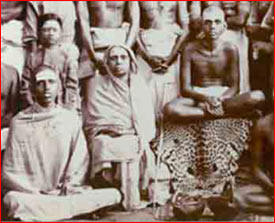 Before
their arrival, Bālaswāmy moved to another place. On the east side of
Tiruvannamalai, there was Pavazhakkuṉṛu.
On the top of the mountain, there was a temple and a cave. When
Bālaswāmy went into the temple, the officiating priest not knowing
Bālaswāmy was inside, locked him up inside the temple many times.
Pavazhakkuṉṛu
was more peaceful. Thereto, some came. The crowd thinned out. He
experienced and enjoyed the solitary life there. A test of that
experience came.
Before
their arrival, Bālaswāmy moved to another place. On the east side of
Tiruvannamalai, there was Pavazhakkuṉṛu.
On the top of the mountain, there was a temple and a cave. When
Bālaswāmy went into the temple, the officiating priest not knowing
Bālaswāmy was inside, locked him up inside the temple many times.
Pavazhakkuṉṛu
was more peaceful. Thereto, some came. The crowd thinned out. He
experienced and enjoyed the solitary life there. A test of that
experience came.
Bālaswāmy’s mother Azakambikai and her brother-in-law Nagaswamy came to
Tiruvannamalai, searched for him in the mango grove and Gurumūrtham and
finally came to Pavazhakkuṉṛu. As cotton catches fire, mother
Azakambikai caught sight of his son. She exploded with crying, sobbing
and welling of tears. She was happy to see her son but cried with
sorrow. Anyone with heart, mind, soul, eyes, ears…will be perplexed and
disturbed.
‘This is my son. This is my son. Yes, he is my son! Venkatrāmā!
Venkatrāmā,
my son you are… You are my son. Azakambikai cried aloud to the surprise
of the assembled motley crowd. But, Bālaswāmy stirred little and sat
there like a stone idol.
A few other Mahāns had this ordeal.
‘Go anywhere, do anything! When I die, you must stand by my side
and take me to the shore. I don’t want to be an unclaimed helpless dead
body, Saṅkarā! As the mother made this plea, the Jñāṉi gave his
assurance to his mother, came by air and according to her desire lighted
the funeral pyre and performed the funeral Saṃskāras.
That Sannyasi could dismiss the pleas of others. How could he reject the
pleas of his mother? How could he reject Sathyam asked of him? The
mother had him on her breasts, shoulders… held him on her waist, on her
lap, embraced him, helped him stand and walk, put him to bed keeping
awake until he went to sleep, fed him, clothed him, (changed his diaper)
loved him more than life. How could he reject her request?
The mother stood before the recluse, ‘My son you are! Venkatramā,
come home. I will serve you rice. You can sit in my room. No one will
bother you. Come home. You are my son, right…Do not give up on your
mother. What mistake did I ever make? What sins did I commit? Why did
you abandon me? I never said a word in anger. Don’t study, Venkatramā!
Don’t have to go to school, Venkatramā. I will prepare and serve you the
Kuzhambhu and curried Brinjal preparations you.
You sit on a mountain wearing matted hair. I bore you in my womb. Now it
is burning. What…
(addressing her dead husband) You went out in comfort, leaving me to
witness these cruel things Have you seen the condition of your son? Why
don’t you give him some advice? You are the boy who grew up without a
father. The townspeople will blame you for dying and leaving him without
a father. The blame on you: is it not a blame one me?
With no stirring of body or soul, and no tears in the eyes, Bālaswāmy
sat like a statue. That he was totally detached caused his lack of
empathy with his mother.
Azakambikai anger and frustration took a turn.
|
-
தரிசிப்போம்...
Let us get Darśan.
|
|
Sakthi
Vikatan
2010-11-05-part2
Kanchi Mahan the God of Mercy
Pattābhi (the live-in caretaker) had been to many places with Periyava.
He rendered service to him to his heart’s content, both in and
out of Mutt.
“With Periyava, Guru
Mahādēvēndra Sarasvati Swāmygaḷ Ārāthaṉai took place on the banks of
river in Ṣahābhāth town. That Ārāthaṉai is called Guru Ārāthaṉai.
Periyava took ritual Śnāṉam (bath) twice a day.
Mettur Chemical Ramaṇi
was the grandson of engineer Vaidya Nāthaiyar.
The Mumbaikars used to come to him bringing Dhoti, fruits…
Wherever Periya stays, the Guru
Ārāthanai
was conducted with fanfare. Mettur Rajagopal was responsible for the
proper conduct of the ceremony. He made all the arrangement for the
conduct of the Ārāthanai in the traditional fashion and according to
injunctions. He lives in Govindapuram, having received Sannyasa vows
from Periyava.
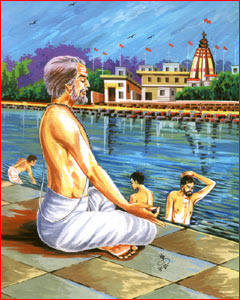 Guru
Ārāthanai involves much work: Dakṣiṇa,
Vēṣṭi.
I was of help to Rajagopal in the conduct of Ārāthanai.
Guru
Ārāthanai involves much work: Dakṣiṇa,
Vēṣṭi.
I was of help to Rajagopal in the conduct of Ārāthanai.
Once it is over, Periyava conducts the evening services. After
completion, he called Rajagopal and told him, “Bring a couple of Vēṣṭis
(Waist cloth, Dhoti) and 101 Rupees.
He received and gave them to me with blessings saying, “This is Guru’s
Prasadam. You remain hale and healthy always.”
In my joy, I did not know what to tell. I am blessed and lucky to
receive with felicitation Guru Prasadam, that too from Periyava on his
own accord.
It is not just the clothes. I have never to this day worked hard in my
life. Because of grace, all my needs are fulfilled.
‘I am the servitor of the servitor. That is my oft-repeated phrase. That
is the way I conducted myself in and out of Mutt including during
pilgrimages.
Stop and Reign ( ).
Use of this phrase is in vogue. Bhagavan stops his Bhakta from following
the path of Māyā (
).
Use of this phrase is in vogue. Bhagavan stops his Bhakta from following
the path of Māyā ( = prevent, obstruct, stop
= prevent, obstruct, stop Māyā) and extend God’s Reign (
Māyā) and extend God’s Reign ( )
over you (for your own good).
Guru employs the same stratagem on you. Likewise, Lord Periyava
exercised ‘Stop and Reign.’ He played with me. He did his līlai (God’s
sportive act). Even now, it appears Periyava touches me on my head with
his staff and blesses me.
)
over you (for your own good).
Guru employs the same stratagem on you. Likewise, Lord Periyava
exercised ‘Stop and Reign.’ He played with me. He did his līlai (God’s
sportive act). Even now, it appears Periyava touches me on my head with
his staff and blesses me.
In Rishikesh, I used to bathe in the Ganges and performed daily Sahasra
Gayatri. But the mind deters one-pointed mode. Why so? Ganga has Power
that draws the mind towards it.
Once Periyava told me, “Until the day you die, do not give up Gayatri
and Gangā Sahasra Gayatri. To this day, I kept my vow. It has its power.
It offers protection to me.
Telling this, the tears were welling up in his eyes.
Darśan will continue.
